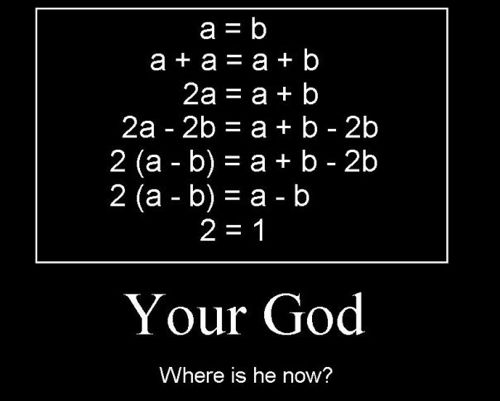Oh my, a math thread. Let me flex my geek muscles.
For most intents and purposes you cannot divide by 0. This is easily shown by basic algebra. I know a lot of people know this stuff already, but I'll try to be methodical about it.
First let's start with normal division. In order for x/y=z to be true, then algebraically, z*y=x must also be true. For example: 10/5=2. Re-arraigned, 2*5=10, so the original equation must be true.
Now let's see what happens with zero:
In order x/0=y to be true, then y*0=x must also be true. However, for any numerical value this simply cannot happen. Say the statement is made that 7/0=3. In order for this to work then 3*0=7. But this obviously isn't true. 3*0=0, and by extension any value for x in the original statement won't hold up because any value multiplied by 0 will equal 0. Therefore in the case of x/0, wherein x is in the domain of all real numbers (and I'm pretty sure all complex too):
x/0=DNE, with DNE being the infamous mathematical abbreviation for Does Not Exist. You cannot divide by zero.
HOWEVER:
The case of 0/0=x is indeed different, as mentioned by the OP. This, of course, in no way "disproves" mathematics. Here's what happens:
If the statement is made that 0/0=3 then 3*0=0 must be true, and indeed it is.
If the statement is made that 0/0=7 then 7*0=0 must be true, which it also is.
If a completely arbitrary number is used like 0/0=3179.145 this still holds up.
Therefore any value of x fulfills the requirement to be the solution for 0/0=x.
This is not the same as DNE. Since values for x exist that count a solutions, even though it can be anything. 0/0 and any function that reduces to 0/0 is known as an Indeterminate Form. 0/0 is also not the only indeterminate form (inf=infinity because this forum isn't recognizing the symbol for it.) inf/inf also has this property, as well as other function that can be transformed into those two examples such as 0*inf, 1^inf, 0^0 inf^0 and inf-inf.
This comes into play a lot in aspects of differential calculus, particularly with l'Hopital's rule. [http://en.wikipedia.org/wiki/L%27H%C3%B4pital%27s_rule] This can be really freaking useful when evaluating derivatives as it simplifies the process considerably.
Umm, yup. This is me geeking out on math for the hell of it. Brings back memories of MATLAB and caffeine.

